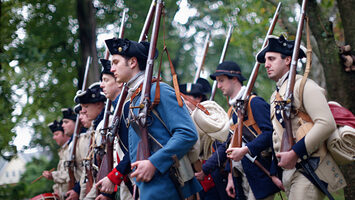Republican People’s Militias
“The establishment of various colonial militias late in 1774 is thus best understood in the light of a long republican Whig dedication to that idea.”

“Radical Whiggery on the Role of the Military: Ideological Roots of the American Revolutionary Militia.”Journal of the History of Ideas 40 (January/March 1979): 43–60.
The ideas of radical English Whigs influenced Americans of the revolutionary generation, not only politically and philosophically (in terms of their understanding of the rights of Englishmen and the good society) but also in the very military structure and organizational methods by which the Americans fought to win their independence. The fundamental core of this outlook was a fear of standing armies and a reliance on republican militia.
A central figure in the development of this view was James Harrington (1611–1677). In hisCommonwealth of Oceana (1656), it was the militia of freeholders which sustained the balanced constitution. These ideas were, in turn, based upon radical Whig perceptions of the history of the Middle Ages and the ancient Gothic constitution. The corruption of society was directly related to the rise of professional standing armies financed by the monarch.
In the late seventeenth century other leaders such as the Earl of Shaftesbury and Opposition spokesmen such as Algernon Sidney reiterated this popular militia tradition, and it was carried into the next century by other radical Whigs such as Robert Viscount Molesworth, John Trenchard, John Toland, Walter Moyle, and [51] Andrew Fletcher.
Militia encampments were seen as educational places to instill republican virtues such as frugality, military discipline, and to encourage personal sacrifice for the public good. Food and dress would be simple and the same for all. In addition to training in the public virtues, Christian doctrine, and the arts of war; schooling would include the study of mathematics, geography, history, and astronomy.
Not only Opposition leaders but other thinkers, such as the philosopher Francis Hutcheson and the jurist William Blackstone, also commented favorably upon the concept of the citizen-soldier.
As is now widely known, all of these Opposition works were favorite reading by Americans on the eve of the Revolution. When the British military occupied Boston during the late 1760s, a number of Americans, including Samuel Adams, contributed newspaper articles to “Journal of the Times” that were widely reprinted and second in circulation only to John Dickinson’s Letters of a Pennsylvania Farmer. One selection argued that enforcement of the law by professional soldiers rather than the citizen’s posse commitatus could only be part of a plot to rob the citizens of their rights and property. If this continued, the militia as the embodiment of the posse, would be the only means by which Americans could “protect personal security, personal liberty, and private property.”
After the Boston Massacre, this theme was repeated in numerous sermons. After the Tea Party and the closing of the port of Boston, the most elaborate statement of this view was developed by Josiah Quincy, Jr., in a little tract Observations on the Boston Port Bill; With Thoughts on Civil Society and Standing Armies.
The establishment of various colonial militias late in 1774 is thus best understood in the light of a long republican Whig dedication to that idea. The whole notion was best summarized perhaps, and certainly as a prelude to the later Second Amendment to the American Constitution, by the Massachusetts Provincial Congress’s resolution in 1774 “that a well-regulated Militia, composed of the gentlemen, freeholders, and other freemen, is the natural strength and only stable security of a free government.”